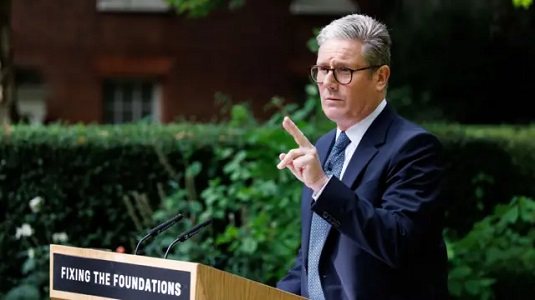
Here Starmer confirmed (yet again) what his project is about: the renovation of the state. If in revolutionary politics the subject is the working class and the project is its self-liberation, and in Tory politics it is - wrapped in ideological swaddling - the bourgeoisie and defending the class relations that maintain them, for right wing Labour in its Fabian, "revisionist", Blairite, and Starmerite iterations the state is the only legitimate agent of politics and its perfection is their purpose.
Consider the two parts to the speech. Returning to the racist riots, Starmer said that these were unmistakably inspired by the far right (but no words on those who fanned the flames), but there was an element of opportunism at work - an opportunism born of the Tories' dereliction of duty. Those who rioted knew the criminal justice system was teetering on the brink and prison places were at a premium, and acted as though there wouldn't be any arrests, let alone jail terms. Thanks to Tory recklessness. And, to a degree, Starmer corrected his reluctant earlier response by condemning efforts at trying to burn down hotels full of human beings (a rare moment of humanising asylum seekers in British politics) and praising communities who came together in the riots' aftermath to rebuild. Note he didn't go as far as the King, but again thanked the police and first responders for their service. Starmer therefore condemns the riots as a failure of Tory statecraft, passes over the role of communities and anti-fascists in defending themselves, praises the spirit of resilience, and then returns to the agents of the state as the legitimate saviours of the situation.
The second part was focused on the state itself. Starmer talked a lot about the £22bn "black hole" in state finances which, in reality, only exists because of how the Chancellor has chosen to frame public spending. Hence the tough decision of scrapping the Winter Fuel Allowance for all pensioners not in receipt of pension credits. This is being taken away so the NHS can be fixed. Likewise, when challenged on above inflation pay rises for public sector workers and railway workers, Starmer's defence owed nothing to the injustices these deals partly correct and everything to economic efficiency, getting the health service working, and so on. It was the right decision not by the workers, but by the state.
This is how it will be. The state is presented as a neutral arbiter, and one that has been broken by the Tories. Fixing it means being "honest about the challenges we face" and ending the "politics of the easy answer". Therefore October's budget is going to be "painful" and, hinting at possible wealth taxes, those with the "broadest shoulders" will bear the most burden. But Starmer has promised nothing but "big asks" for the country but it's something we can get through "together".
Starmerism isn't concerned with "social justice". Improving life for the poorest is not a priority. If these happen, it's an incidental by-product of re-engineering and renewing the state. What matters is getting it functioning "properly" again and using the state as a reliable partner for capital accumulation, the maintenance of the wage relation, and ensuring that whatever changes Starmer's political project brings about, the fundamentals of class, wealth, and private ownership will remain unchanged. As a statement of intent, this came through loud and clear.
Image Credit
The most inadvertently revealing moment for me in the immediate aftermath of the election was when radio 5 had a retired senior civil servant on to explain the transition of power - how senior civil servants meet with new ministers to find out what they want, and to tell them how things work in government. Asked if those are sometimes difficult conversations, he said something like “they can be, but they won’t be in this instance. You know, Keir was DPP, Rachel was in the Treasury…”. I think the implication was meant to be ‘they already know how things get done’. But it came across more like ‘they are our people’.
ReplyDeletePhil keeps going on and on in article after article about The Trilateral Commission and US State Department's man, Starmer, and his cronies having some sort of distinct 'mission, even some sort of distinct ideology, to 'make the UK state work properly' , but not for most of us - just the capitalist class. This is baloney I'm afraid . To claim even such an unpleasant 'mission', as this to the rag bag of third rate serial liars, careerists, crooks and grovellers to the rich and powerful, is to elevate the New Labour creatures unnecessarily above what they actually are. The New Labour Party and its constituent MPs and party machine bureaucrats deserves simply to be described as an imposed compradore political class - a bunch of Quislings, who have no other purpose but to serve their oligarch rich paymasters and the US hegemon , whilst enriching themselves . They are no difference in essence from the imposed Vichy regime in wartime France, or Quisling in Norway. They actually have NO ultimate long term 'mission ' at all, just short termist measures to keep the current corrupt UK state running on its current disastrous path as long as possible , whilst destroying our living standards to the benefit of the rich - according to instruction from their US State Department and superrich oligarch paymasters .
ReplyDelete